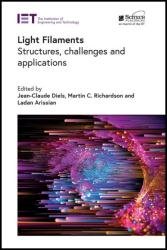Light Filaments: Structures, challenges and applications
- Добавил: literator
- Дата: 3-01-2022, 07:06
- Комментариев: 0
 Название: Light Filaments: Structures, challenges and applications
Название: Light Filaments: Structures, challenges and applicationsАвтор: Jean-Claude Diels, Martin C. Richardson
Издательство: Scitech Publishing
Год: 2022
Страниц: 391
Язык: английский
Формат: pdf (true), epub
Размер: 19.0 MB
A laser of sufficient intensity traveling through air will - by itself - engineer a narrow channel over which light will propagate for tens or even hundreds of meters. Such filaments of laser light were first created at the end of the twentieth century, and investigators are now beginning to explore new applications for them.
Light Filaments: Structures, challenges and applications brings together exciting results from this area of research. With the development of high repetition rate sources, new aspects of waveguiding are emerging based on the hydrodynamic perturbation created by each filamenting pulse. This book is organized from general overviews to more specialized topics and is aimed at those involved in lasers and other optical wave propagation systems.
The goal of this book is to cover the multiple aspects of light filamentation from strong field ionization and molecular properties to laser development and beam shaping, and the wide range of radiation associated with it from THz, lasing in air to supercontinuum generation. The book starts with tutorial chapters about the science of filamentation, followed by in depth chapters on the latest research, technologies and applications in atmospheric studies, guiding waves, laser induced discharge and lightning.
For sufficiently high laser intensity, air itself is a nonlinear medium. As for filamentation in solids, the discovery of air filaments was through laser damage. Tiny “pits” were observed in mirrors placed in the path of an initially uniform high-power laser beam, at several meters from the source. This laser damage was attributed to a nonlinear propagation effect in air for femtosecond near-infrared (IR) and ultraviolet pulses. What was initially perceived as a minor annoyance (pits in a mirror) turned into a major research area, giving birth to a biannual international filament conference series. It appeared to offer an unexpected answer to a call for proposal from the Department of Defense starting with “Given that atmospheric effects impose a fundamental limitation on the propagation of light….” In fact, atmospheric effects impose only a fundamental limitation on linear propagation of light. Early experiments showed that a filament sent through the heat of a candle was unaffected, while the same candle positioned under the pre-filamented macroscopic beam prevented the formation of a filament. Turbulence of the atmosphere is of a much larger scale than the filament transverse dimensions. Radiation at 800 nm is at the limit of the human eye sensitivity. However, mJ energy filamented near an IR pulse creates a spectacular rainbow of colors on a distant target.
This book is the result of a Multidisciplinary University Research Initiatives (MURI) Program on light filaments from the USA Office of Naval Research.
Contents:
About the editors
Introduction
Chapter 1 Femtosecond laser filamentation and applications
Chapter 3 Long-wave infrared filamentation in air: lasers and high-field phenomena
Chapter 4 Extreme temporal compression of ultra-broadband mid-infrared pulses
Chapter 5 Interaction of optical beams in nonlinear media
Chapter 6 Nonlinear processes in coupled light filaments: numerical studies
Chapter 7 Filamentation of femtosecond laser pulses under tight focusing
Chapter 8 Linear and nonlinear exotic light wave packets, physics and applications
Chapter 9 Dimensionless numbers for numerical simulations and scaling of ultrashort laser pulse filamentation
Chapter 10 Kerr instability amplification
Chapter 11 Plasma studies in filament
Chapter 12 Filamentation for atmospheric remote sensing and control
Index
Скачать Light Filaments: Structures, challenges and applications
[related-news] [/related-news]
Внимание
Уважаемый посетитель, Вы зашли на сайт как незарегистрированный пользователь.
Мы рекомендуем Вам зарегистрироваться либо войти на сайт под своим именем.
Уважаемый посетитель, Вы зашли на сайт как незарегистрированный пользователь.
Мы рекомендуем Вам зарегистрироваться либо войти на сайт под своим именем.
